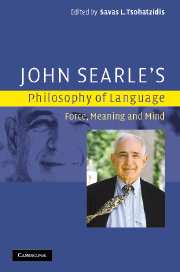Book contents
- Frontmatter
- Contents
- List of contributors
- Acknowledgments
- Introduction
- 1 What is language: some preliminary remarks
- PART I FROM MIND TO MEANING
- 2 Content, mode, and self-reference
- 3 Searle against the world: how can experiences find their objects?
- 4 Seeing what is there
- 5 Intentionalism, descriptivism, and proper names
- 6 On the alleged priority of thought over language
- 7 Rule skepticism: Searle's criticism of Kripke's Wittgenstein
- PART II FROM MEANING TO FORCE
- References
- Index
2 - Content, mode, and self-reference
Published online by Cambridge University Press: 08 January 2010
- Frontmatter
- Contents
- List of contributors
- Acknowledgments
- Introduction
- 1 What is language: some preliminary remarks
- PART I FROM MIND TO MEANING
- 2 Content, mode, and self-reference
- 3 Searle against the world: how can experiences find their objects?
- 4 Seeing what is there
- 5 Intentionalism, descriptivism, and proper names
- 6 On the alleged priority of thought over language
- 7 Rule skepticism: Searle's criticism of Kripke's Wittgenstein
- PART II FROM MEANING TO FORCE
- References
- Index
Summary
ILLOCUTIONARY FORCE, PSYCHOLOGICAL MODE, AND THE FALLACY OF MISPLACED INFORMATION
Searle famously characterized speech act types in terms of a number of “conditions” or “rules” they are supposed to obey, including conditions on their propositional content. If I order John to wash the dishes, the content of the order is the proposition that John will wash the dishes – the same proposition that would be the content of an assertion if I said that John will wash the dishes, or of a question if I asked whether John will wash the dishes. While assertions or questions can have any proposition as their contents, however, orders and directive speech acts more generally are supposed to be more constrained: their content can only be a proposition bearing upon a future act of the hearer, as in this particular case. Likewise, promises are such that their contents can only be a future act of the speaker (Searle 1969: 57–8).
In my own book on speech acts I criticized Searle's claim and argued that it rests on what Barwise and Perry later dubbed the “fallacy of misplaced information”:
The notion of the hearer's (or speaker's) future behavior does have a role to play in the analysis of commissives and directives, but … the proper place for this notion is in the analysis of the illocutionary force of directives and commissives, not in the analysis of their propositional content. Any proposition whatever can be the content of a directive or a commissive; it suffices that the speaker's utterance express his intention that the hearer (or the speaker), by virtue of this utterance expressing this intention, behave in such a way as to make the proposition true.[…]
Information
- Type
- Chapter
- Information
- John Searle's Philosophy of LanguageForce, Meaning and Mind, pp. 49 - 63Publisher: Cambridge University PressPrint publication year: 2007
